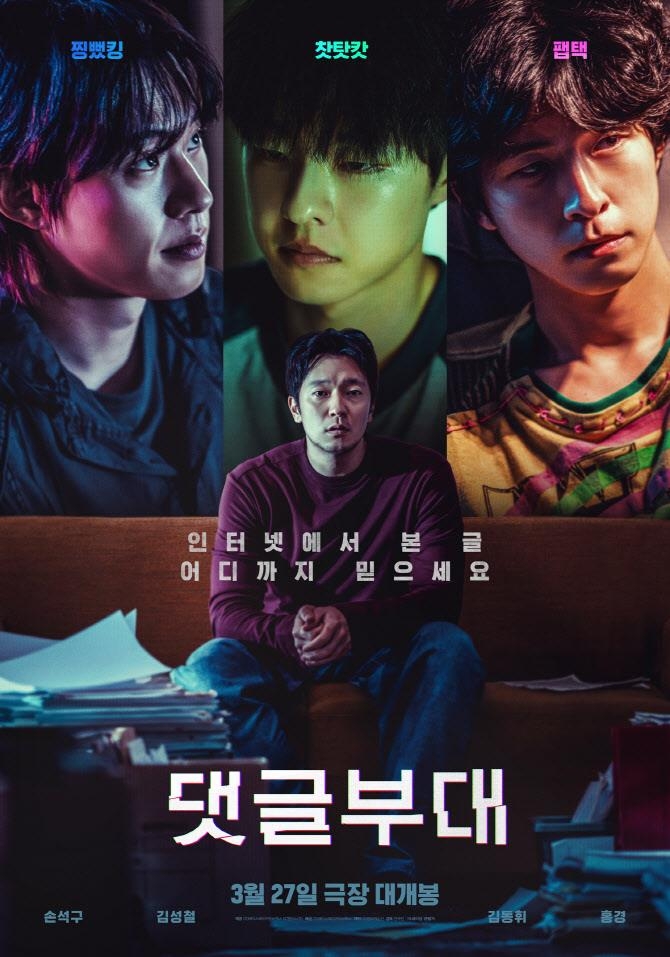- California Assembly OKs highest minimum wage in nation
- S. Korea unveils first graphic cigarette warnings
- US joins with South Korea, Japan in bid to deter North Korea
- LPGA golfer Chun In-gee finally back in action
- S. Korea won’t be top seed in final World Cup qualification round
- US men’s soccer misses 2nd straight Olympics
- US back on track in qualifying with 4-0 win over Guatemala
- High-intensity workout injuries spawn cottage industry
- CDC expands range of Zika mosquitoes into parts of Northeast
- Who knew? ‘The Walking Dead’ is helping families connect
(Movie Review) ‘Troll Factory’ navigates blurred line between fake, real with anticlimactic finale
The upcoming satirical film “Troll Factory” opens with the story of a reporter who investigates the corruption of the conglomerate Manjeon Group, only to find himself pushed to the brink.
The reporter, Im Sang-jin (Son Suk-ku), embarks on an investigation after receiving a tip from a medium-sized company executive regarding technology theft by the group. Despite Im’s successful persuasion of his boss to publish the allegations, his story takes an unexpected turn as it’s attacked online as fake, leading him to be labeled as a “sensationalist journalist” overnight and suspended as a punitive measure.
Later on, a young man approaches Im, claiming to have evidence of online manipulation. He promises to disclose that a “commenting squad” or troll factory is responsible for discrediting Im’s story through opinion manipulation. The man then confesses that he and his two friends from the so-called Team Aleph engaged in unethical activities for personal gain.

The main narrative revolves around the confrontation between the reporter’s efforts to uncover the truth and the enigmatic troll factory, whose existence has yet to be verified.
Inspired by the 2015 novel by former daily reporter Chang Kang-myoung, the film explores the intriguing yet slippery theme of opinion manipulation. It encourages thought and discussion on the topic by questioning the existence of a troll factory and prompting the audience to contemplate whether it is real or merely an urban legend.
For director and screenwriter Ahn Gooc-jin, known for the 2015 black comedy “Alice In Earnestland,” the lingering mystery of “commenting squads” inspired him to make the film.
“While there appears to be a phenomenon (of opinion manipulation), concrete evidence confirming their existence is elusive,” he said during a press event earlier this month.
Until midway through, the movie effectively grips the audience with its briskly paced narrative, delving into Im’s challenges and the clandestine operations of Team Aleph, such as maximizing the limited impact of cigarette advertisements, promoting failed movies or turning an ordinary girl into an online sensation.
Employing a daring editing approach accompanied by heart-pounding sounds, the film adeptly blends virtual and real footage to explore the history and shaping of online opinions in South Korea. The compelling chemistry among the cast members enhances the film’s ability to captivate the audience.
As the team grapples with internal conflicts regarding the integrity and ethics of its covert operations, however, the movie appears to lose its momentum.
The film fast-forwards two years within its narrative before concluding rather abruptly, leaving the audience with a lackluster ending that seemingly undercuts the character development and narrative buildup established in the earlier and middle parts of the film.
But its ending appears to mirror reality, where it is difficult to grasp the truth, leaving each individual to decide what to believe or not.
The movie is slated for release Wednesday.













